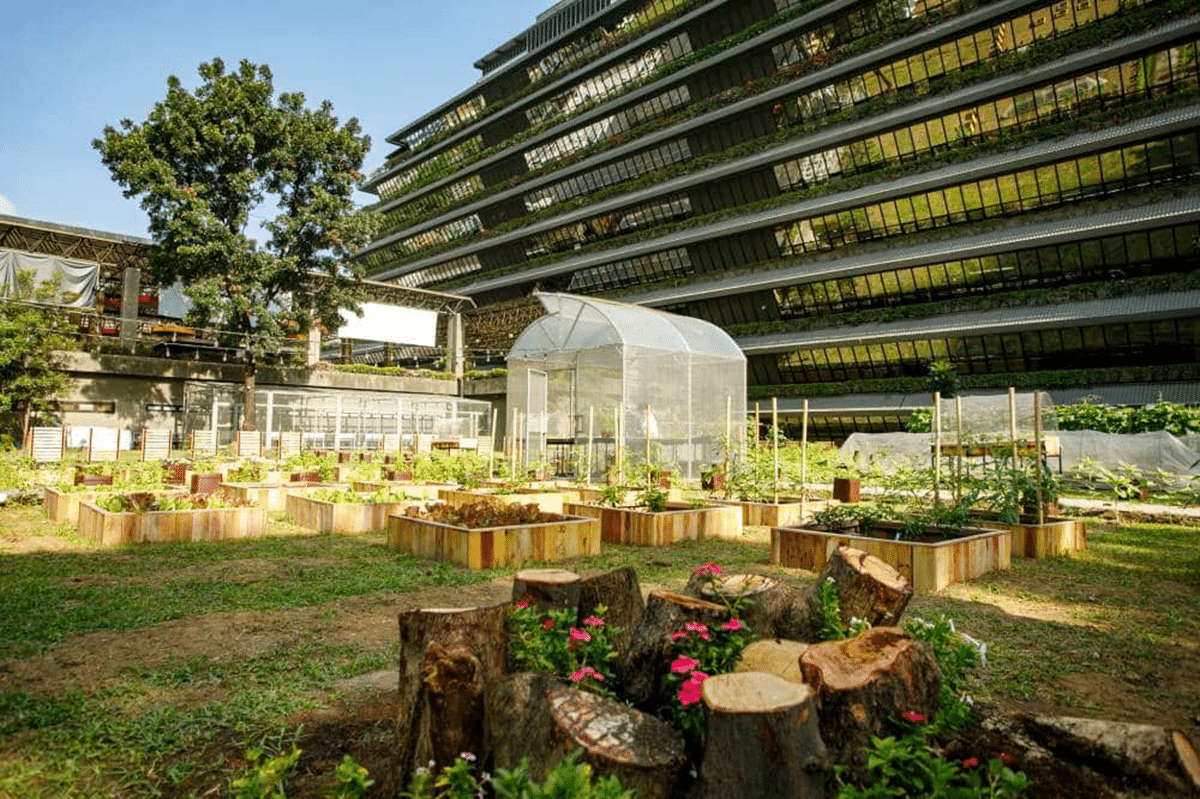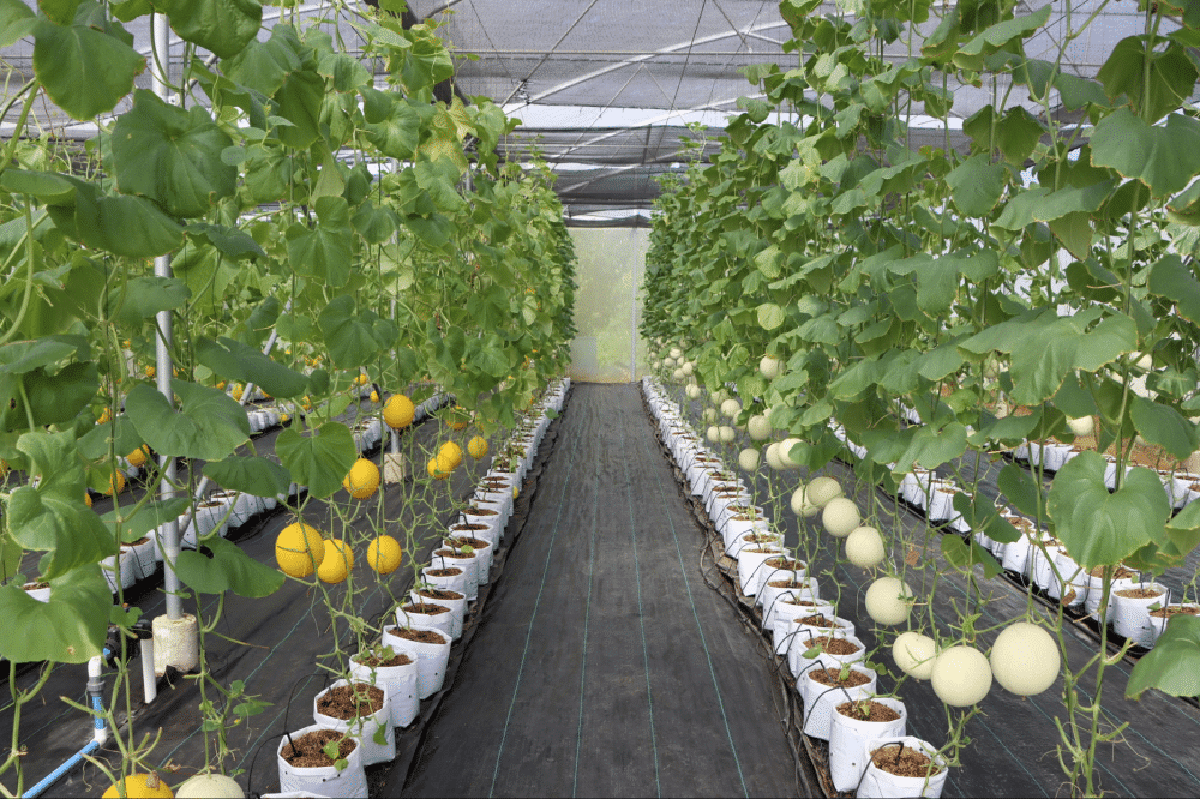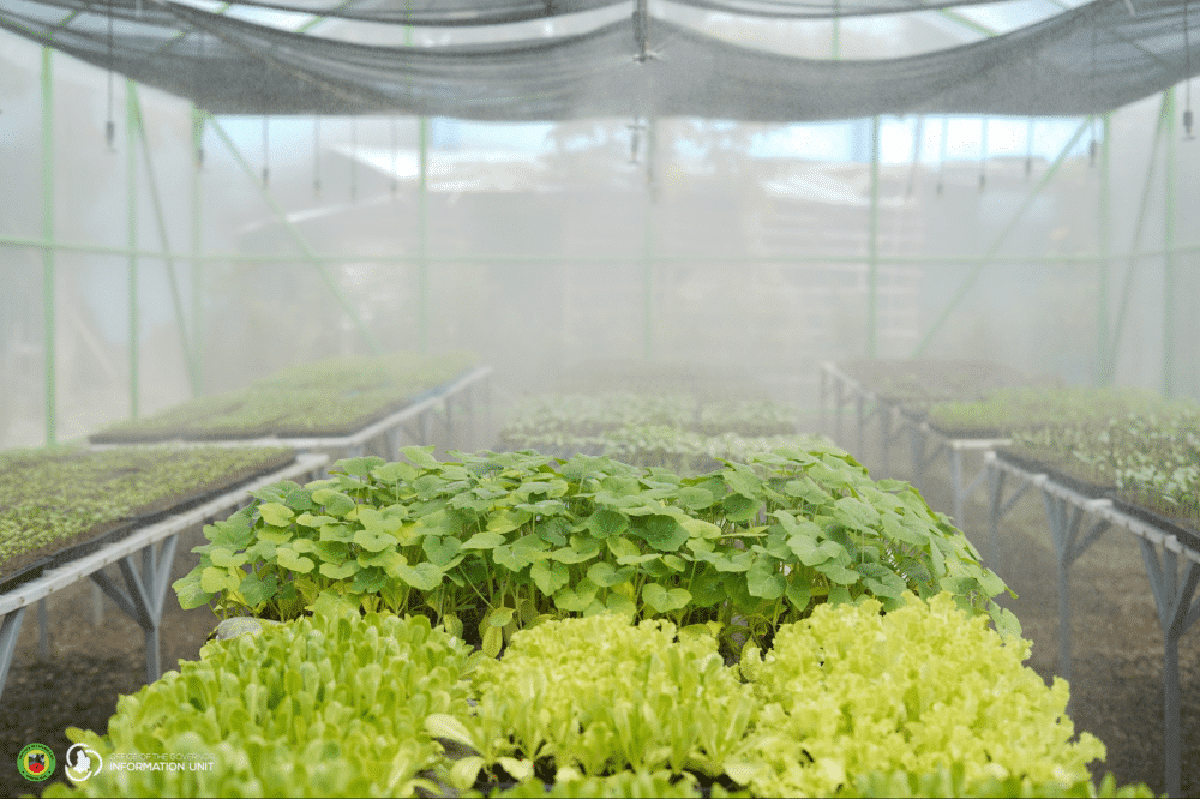Urban farming takes root as a strategy for food security

Opened in 2021, the garden at the San Miguel Head Office Complex is the pilot site of our Backyard Bukid initiative. It has expanded over the years and now has 80 garden plots and a plant nursery. (Photo courtesy of San Miguel Corp.)
The government and the private sector as well have been looking at urban farming as one of the key solutions to achieving food security, a view that was further cemented at the height of the COVID-19 pandemic.
Listed conglomerate San Miguel Corp. (SMC) is actively championing this movement, having launched in 2021 its Backyard Bukid initiative in order to augment food supplies and income of its service personnel during such a difficult time.
SMC piloted its backyard farm nestled at the company’s head office complex in Mandaluyong City. Situated behind its iconic Francisco Manosa-designed building, the urban farm has more than 30 varieties of vegetables and flowering plants. “Most of the crops from the ‘Bahay Kubo’ song can be found in our urban farms, SMC tells the Inquirer.
READ: Change is in the air: A new era begins
These include ampalaya, eggplant, string beans, patola, upo, mustasa, tomatoes, and ginger; plant herbs such as sweet basil, rosemary and tarragon; and leafy greens like lettuce, arugula, kale and bokchoy. An undertaking of the San Miguel Foundation, the project has since been grown to include a plant nursery and about 80 garden plots that serve as a center for employee wellness, volunteerism and training.
The initiative has also expanded in terms of locations, such that SMC now has five Backyard Bukid sites. Aside from the company’s headquarters, there are also on-premises farms at the San Miguel Yamamura Packaging Corp. facilities in General Trias, Cavite and Pandacan, Manila; SMC Better World Smokey Mountain Community Center in Tondo; and Bulacan Bulk Water facility in Bulacan. Also, there are two community-based Backyard Bukid sites in Camarines Sur and Hagonoy, Davao Del Sur. A third one is set for launch in Bukidnon, meant for the residents of communities near SMC facilities.
For its part, the government recognized the crucial role of urban agriculture, or the practice of cultivating crops in limited spaces in the metropolis, by creating a dedicated banner program.
In 2022, the Department of Agriculture (DA) introduced the National Urban and Peri-Urban Agriculture Program (Nupap) to develop farming in urban and peri-urban areas or locations between the city and the countryside.
The DA says urban gardening “is seen as an intervention in achieving food security and providing alternative sources of livelihood,” a thrust that is spelled out in Administrative Order No. 3 signed in 2022 and which created the Nupap.
“The country is faced with rising pressures due to unstable food supplies, climate change, and growing unemployment as a consequence of the COVID-19 pandemic,” the DA says.
This initiative seeks to increase food production and reduce costs to cushion the impact of global concerns such as food security, climate change and rising costs of fuel and other farm inputs.
READ: Banking runs deep in Favilas’ veins
Meanwhile, the San Miguel group is keen on replicating the Backyard Bukid in other areas where the conglomerate has offices nationwide.
“Given its success, we’ve been working to expand the program and bring it to our other facilities and partner communities. We are also looking at bringing more learning sessions about urban farming to encourage more employees to take part in this initiative,” SMC says.
Last January, the project was expanded through a partnership with nonprofit organization Urban Farmers PH, to enhance the farms’ diversity and variety of produce. Urban Farmers PH provides weekly plant care sessions for the support staff, lasting for an hour every morning and afternoon.
Back then, SMC president and CEO Ramon Ang said that apart from promoting urban agriculture, Backyard Bukid has also become a space for SMC support staff to collaborate and learn life-long skills that will help them become more resilient and self-sufficient.
“Our goal is to extend this initiative to even more facilities, involve more employees, and encourage other companies to do the same,” Ang added.
The Bureau of Plant Industry (BPI), which the DA supervises, has been implementing the Nupap since last year sans any budget allocation from the government. This year, the government earmarked P406.13 million to implement this project, higher than P376 million in 2023. The BPI is seeking a budget of P439 million in 2025, an increase of 8 percent from this year if approved.
In a briefer provided to the Inquirer, the Nupap Secretariat says that one of the major projects for the coming year is the provision of agricultural machinery, equipment and facility support services with an indicative funding of P143.16 million.
In light of this, the establishment of production facilities — particularly protected agriculture systems and controlled environment agriculture— were prioritized in order to achieve an optimal growing environment for crops even with harsh weather conditions.
Thus, interventions under the Nupap include greenhouses (in various iterations like rainshelters, rainshelters with drip irrigation, screenhouses, nethouses, grow-out nurseries, greenhouses with hydroponics, and solar-powered greenhouses with hydroponics) as well as indoor cultivation systems or containerized vertical farms, and mushroom houses.
The proposed budget for Nupap initiatives also covers infrastructure projects such as poultry houses, vermicomposting facilities, edible landscaping and packaging houses.
Aside from support services and training programs, the Nupap implementers will distribute seeds and planting materials, primarily highland and lowland vegetables and herbs and spices given their relatively shorter growing period and are easily cultivated in limited spaces.
During ceremonies held in September to give recognition to outstanding urban and peri-urban gardens, Agriculture Secretary Francisco Tiu Laurel Jr. cited the crucial role of urban agriculture in addressing global challenges including food security.
READ: Timeless BSP art: A glimpse into Remolona’s favorites
“From mitigating climate change to enhancing food resilience and improving mental well-being, your gardens serve purposes beyond mere aesthetics,” Tiu Laurel says.
The World Bank estimates that by 2050, about 102 million Filipinos will be living in cities, equivalent to more than 65 percent of the country’s total population. In a report, the World Bank says the country’s urban population has grown by over 50 million people in the past five decades.
On a global scale, the United Nations’ Food and Agriculture Organization says 55 percent of the world’s population resides in urban areas while 79 percent of all food produced is allotted for consumption in cities.
On its website, the FAO says urban and peri-urban agriculture “offers a fundamental strategy for building the resilience of a city’s food supply.”
“It involves urban and peri-urban actors, communities, methods, places, policies, institutions, systems, ecologies and economies, largely using and regenerating local resources to meet changing needs of local populations while serving multiple goals and functions,” the FAO says.


